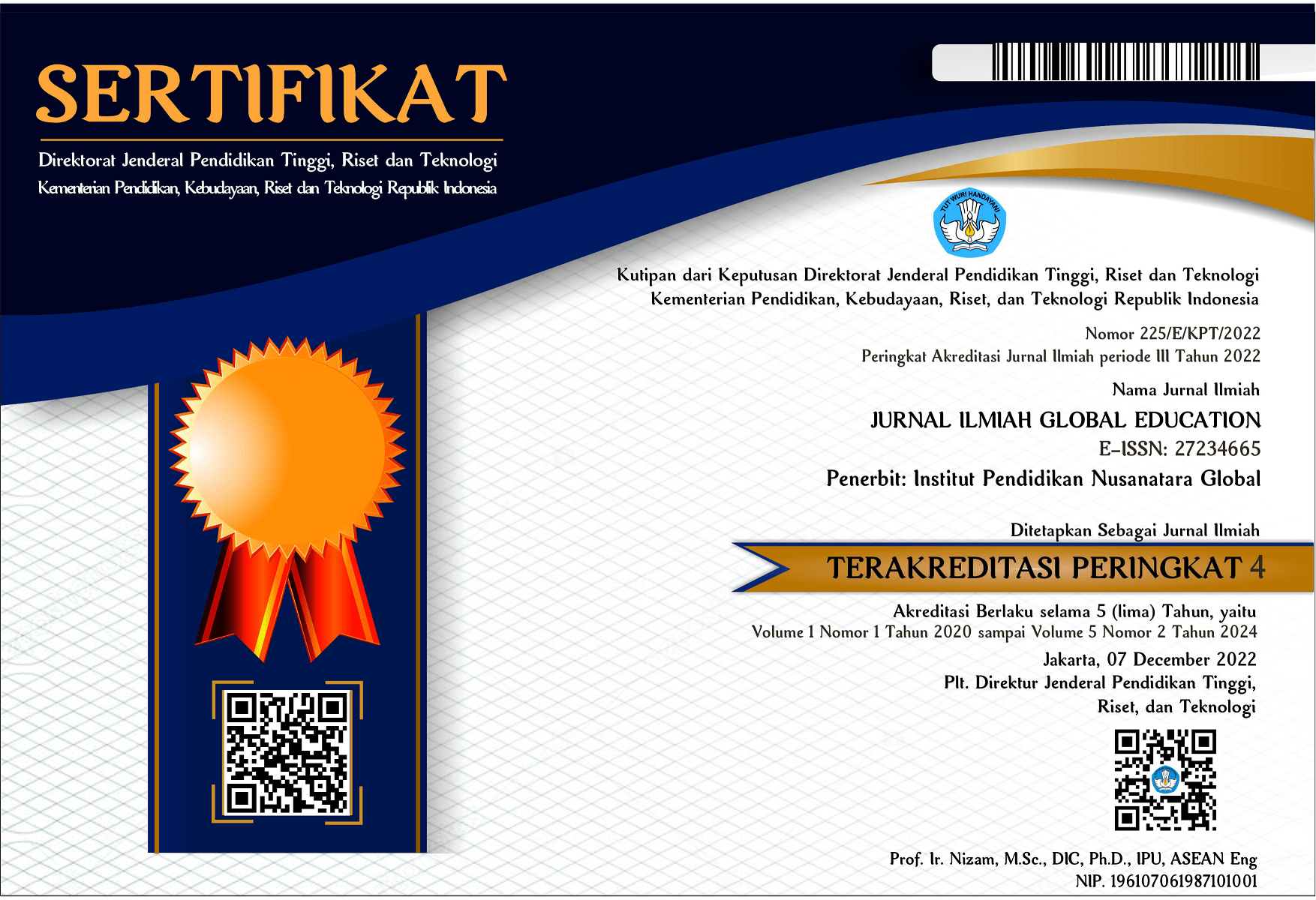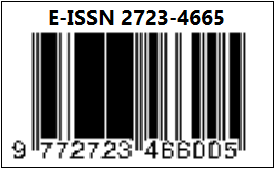Antecedents of Satisfaction and The Influence of Recommend Intention
DOI:
https://doi.org/10.55681/jige.v5i2.2642Keywords:
pro growth destination authenticity, pro growth destination image, satisfaction, recommend intentionAbstract
Visitor satisfaction is an important factor in tourist destinations. Therefore, the aim of this research is to test destination image, Emotional experience, Pro-Growth Destination Authenticity, satisfaction and influence on Recommend Intention. The population of this research is tourists visiting Bali. The sample in this study was 200 respondents using a purposive sampling technique with criteria of age 17 years above. tourists visiting tourist villages a minimum of once a year. This research is quantitative research with a survey method. The data collection tool in this research used a questionnaire. Data analysis using PLS-SEM. The research results show that the variables pro growth Destination Image, Pro Growth Destination Authentication, Emotional Experience have a positive and significant influence on satisfaction, and Satisfaction has a positive and significant influence on intention to recommend.
Downloads
References
Anggraeni, R. P. (2023). Dampak Pengembangan Industri Pariwisata Terhadap Kondisi Ekonomi Masyarakat Sekitar (Studi di Pantai Embe Desa Merak Belatung Kalianda Lampung Selatan). Http://Digilib.Unila.Ac.Id/.
Ariestyani, K., & Utami, A. B. (2022). The Heart Beat of Toba: A Storynomics of Super-priority Tourism Destination Branding in the New Normal Era. Tourism and Sustainable Development Review, 3(1), 91–104. https://doi.org/10.31098/tsdr.v3i1.65
Berlianto, M. P. (2019). Identifying Antecedents and Consequences of Customer Satisfaction in the Full-Service Airline Industry. Jurnal Manajemen, 23(3), 496. https://doi.org/10.24912/jm.v23i3.586
Brooks, L. L. Z., & Johnston, J. (2012). Peran Wisata Kuliner Sebagai Bentuk Pembangunan Citra Destinasi di Kota Bandung. Jm, 4(April), 1–55. http://publication.petra.ac.id/index.php/dkv/article/view/1940
Chin, W. (1998). The Partial Least Squares Approach to Structural Equation Modeling (E. Modern Methods for Business Research, In: G. A. Marcoulides (ed.)). Lawrence Erlbaum Associates Publisher.
Christiawan, F., Yoyok, B., & Sutanto, R. P. (2014). Perancangan Destination Branding Kawasan Wisata Kuliner Lentog Tanjung Kabupaten Kudus. Jurnal DKV Adiwarna, 1(4), 12. http://publication.petra.ac.id/index.php/dkv/article/view/1940
Daskin, M., & Pala, K. (2022). Importance of destination image and customer satisfaction for new emerging destinations: An empirical research case from tourism development perspective. PASOS Revista de Turismo y Patrimonio Cultural, 20(5), 1203–1217. https://doi.org/10.25145/j.pasos.2022.20.081
Dr. Mochlasin, M. A. (2018). CONSUMER BEHAVIOR. Lembaga Penelitian dan Pengabdian kepada Masyarakat (LP2M) IAIN Salatiga.
Eid, R., El-Kassrawy, Y. A., & Agag, G. (2019). Integrating Destination Attributes, Political (In)Stability, Destination Image, Tourist Satisfaction, and Intention to Recommend: A Study of UAE. Journal of Hospitality and Tourism Research, 43(6), 839–866. https://doi.org/10.1177/1096348019837750
Feeney, J. A. (1999). Adult attachment, emotional control, and marital satisfaction. Personal Relationships, 6(2), 169–185. https://doi.org/10.1111/j.1475-6811.1999.tb00185.x
Finn, A., Wang, L., & Frank, T. (2009). Attribute Perceptions, Customer Satisfaction and Intention to Recommend E-Services. Journal of Interactive Marketing, 23(3), 209–220. https://doi.org/10.1016/j.intmar.2009.04.006
Ghozali, I. (2020). Aplikasi Analisis Multivariate dengan Program IBM SPSS 21. Semarang: Badan Penerbit UNDIP.
Ghozali, I., & Hengky, L. (2020). Konsep, Teknik Dan Aplikasi Menggunakan Program Smart PLS 3.0. In Universitas Diponegoro. Semarang.
Hair, J. F., Ringle, C. M., and Sarstedt, M. (2018). PLS-SEM : Indeed A Silver Bullet,. Journal of Marketing Theory and Practice, 19(2).
Han, H., Al-Ansi, A., Olya, H. G. T., & Kim, W. (2019). Exploring halal-friendly destination attributes in South Korea: Perceptions and behaviors of Muslim travelers toward a non-Muslim destination. Tourism Management, 71(October 2018), 151–164. https://doi.org/10.1016/j.tourman.2018.10.010
Hernandez-Fernandez, A., & Lewis, M. C. (2019). Brand authenticity leads to perceived value and brand trust. European Journal of Management and Business Economics, 28(3), 222–238. https://doi.org/10.1108/EJMBE-10-2017-0027
Ignatov, S. (2016). Segmenting Canadian Culinary Tourists. Jakarta: Current Issues in Tourism.
Irazábal, C. (2018). Coastal Urban Planning in The ‘Green Republic’: Tourism Development and the Nature–Infrastructure Paradox in Costa Rica. International Journal of Urban and Regional Research, 42(5), 882–913. https://doi.org/10.1111/1468-2427.12654
Jensen, M. C., & Meckling, W. H. (1976). Theory of the firm: Managerial behavior, agency costs and ownership structure. Journal of Financial Economics. https://doi.org/10.1016/0304-405X(76)90026-X
Kastenholz, E., Carneiro, M. J., Marques, C. P., & Loureiro, S. M. C. (2018). The dimensions of rural tourism experience: impacts on arousal, memory, and satisfaction. Journal of Travel and Tourism Marketing, 35(2), 189–201. https://doi.org/10.1080/10548408.2017.1350617
Králiková, A., Peruthová, A., & Ryglová, K. (2020). Impact of destination image on satisfaction and loyalty. Acta Universitatis Agriculturae et Silviculturae Mendelianae Brunensis, 68(1), 199–209. https://doi.org/10.11118/actaun202068010199
Le, H. B. H., & Le, T. B. (2020). Impact of destination image and satisfaction on tourist loyalty: Mountain destinations in Thanh Hoa province, Vietnam. Journal of Asian Finance, Economics and Business, 7(4), 185–195. https://doi.org/10.13106/JAFEB.2020.VOL7.NO4.185
Nguyen Viet, B., Dang, H. P., & Nguyen, H. H. (2020). Revisit intention and satisfaction: The role of destination image, perceived risk, and cultural contact. Cogent Business & Management, 7(1), 1796249. https://doi.org/10.1080/23311975.2020.1796249
Peter, J. P., & Olson, J. C. (2008). Consumer behavior and marketing strategy. Boston: McGraw-Hill/Irwin.
Phillips, D. M., & Baumgartner, H. (2002). The role of consumption emotions in the satisfaction response. Journal of Consumer Psychology, 12(3), 243–252. https://doi.org/10.1207/153276602760335086
Prayag, G., Hosany, S., Muskat, B., & Del Chiappa, G. (2017). Understanding the Relationships between Tourists’ Emotional Experiences, Perceived Overall Image, Satisfaction, and Intention to Recommend. Journal of Travel Research, 56(1), 41–54. https://doi.org/10.1177/0047287515620567
Prayag, G., Hosany, S., & Odeh, K. (2013). The role of tourists’ emotional experiences and satisfaction in understanding behavioral intentions. Journal of Destination Marketing & Management, 2(2), 118–127. https://doi.org/https://doi.org/10.1016/j.jdmm.2013.05.001
Pujiastuti, E. E., Soeprapto, A., Susanta, S., Utomo, H. S., & Maharaniputri, A. (2022). The role of perceived value in understanding tourist experience and post experience at heritage destinations. Jurnal Siasat Bisnis, 26(1), 35–56. https://doi.org/10.20885/jsb.vol26.iss1.art3
Quynh, N. H., Hoai, N. T., & Loi, N. Van. (2021). The role of emotional experience and destination image on ecotourism satisfaction. Spanish Journal of Marketing - ESIC, 25(2), 312–332. https://doi.org/10.1108/SJME-04-2020-0055
Ramkissoon, H., & Uysal, M. S. (2011). The effects of perceived authenticity, information search behaviour, motivation and destination imagery on cultural behavioural intentions of tourists. Current Issues in Tourism, 14(6), 537–562. https://doi.org/10.1080/13683500.2010.493607
Rendusara, T. H. (2024). International Journal of Current Economics & Business Ventures The Influence Of Destination Image On `` Travel Motivation , Perceived Value , And Electronic Word Of Mouth To Revisit Intention At The " Corner Of Story " Art Museum Of Bandung City Internati. International Journal of Current Economics & Business Ventures, 4(1). https://doi.org/https://scholarsnetwork.org/journal/index.php/ijeb
Rifaldo, A., & Wardi, Y. (2021). The influence of percieved value and percieved quality on revisit intention with satisfaction as a mediating variable. Marketing Management, 2(2), 191–203. https://doi.org/10.24036/mms.v2i2.148
San, P. J. (2005). The Causal Relationship of Health Service Quality, Satisfaction, Intention to Revisit and Intention to Recommend Perceived by Health Center Visitors. In Korean Journal of Health Policy and Administration (Vol. 15, Issue 3, pp. 60–78). https://doi.org/10.4332/kjhpa.2005.15.3.060
Shmueli, G., Ray, S., Velasquez Estrada, J., et al. (2016). The Elephant in the Room: Evaluating the Predictive Performance of PLS Models. Journal of Business Research, 69, 4552-4564. https://doi.org/10.1016/j.jbusres.2016.03.049.
Shoukat, M. H., & Ramkissoon, H. (2022). Customer delight, engagement, experience, value co-creation, place identity, and revisit intention: a new conceptual framework. Journal of Hospitality Marketing and Management, 31(6), 757–775. https://doi.org/10.1080/19368623.2022.2062692
Singh, T. V., Naqvi, M. A., & Gowreesunkar, G. (Vanessa). (2018). What Tourism Can Do: The Fall of Pastoral Manali Resort in the Kulu Valley of the Indian Himalayas. Perspectives on Asian Tourism, Part F182, 141–157. https://doi.org/10.1007/978-981-10-8426-3_9
Song, H. M., Kim, K. S., & Yim, B. H. (2017). The mediating effect of place attachment on the relationship between golf tourism destination image and revisit intention. Asia Pacific Journal of Tourism Research, 22(11), 1182–1193. https://doi.org/10.1080/10941665.2017.1377740
Subagio, D. P. W., Hastari, S., & Sutikno, B. (2022). Kekuatan Authenticity pada makanan local tradisional serta hubungannya dengan pride dan loyalty Gen Milenial. Jurnal Manajemen Dan Bisnis Sriwijaya, 19(4), 267–280. https://doi.org/10.29259/jmbs.v19i4.16652
Sulistiyowati, I. (2015). PENGARUH DESTINATION IMAGE, TRAVEL MOTIVATION, DAN KUALITAS PELAYANAN TERHADAP KEPUASAN PENGUNJUNG (Studi Kasus Pada …. Jurnal Ilmiah Manajemen Dan Bisnis, 1(November). https://doi.org/https://repository.mercubuana.ac.id/7924/
Sultan, M. T., Sharmin, F., Badulescu, A., Gavrilut, D., & Xue, K. (2021). Social media-based content towards image formation: A new approach to the selection of sustainable destinations. Sustainability (Switzerland), 13(8), 1–22. https://doi.org/10.3390/su13084241
Taheri, B., Gannon, M. J., Cordina, R., & Lochrie, S. (2018). Measuring host sincerity : scale development and validation. https://doi.org/10.1108/IJCHM-08-2017-0535
Trius, N. V., Agustina, N. K. W., & Yudhistira, P. G. A. (2023). The Effect of Travel Experience, Destination Image, and Destination Trust on Revisit Intention at Ubud Monkey Forest. International Journal of Social Science and Business, 7(3), 680–689. https://doi.org/10.23887/ijssb.v7i3.50231
Wicaksono, M. A., Setyaningtyas, T., & Kirana, A. N. (2021). Relationship Analysis of Destination Image, Sports Involvement, Event Quality and Travel Motives as an Antecedent Factors on Revisit Intention in Recurring Running Sports-Event. The Winners, 22(2), 137–146. https://doi.org/10.21512/tw.v22i2.7434
Widodo, S., Eliyana, E. W., Pratama, A., & Anwar, A. S. (2021). Antecedents and consequences of person-job fit: A literature review. Journal of Legal, Ethical and Regulatory Issues, 24(S5), 1–11. https://doi.org/10.21002/amj.v9i2.5686
Wong, A. (2004). The role of emotional satisfaction in service encounters. Managing Service Quality: An International Journal, 14(5), 365–376. https://doi.org/10.1108/09604520410557976
Yanto, B. T., Lindawati, T., & Pradana, D. W. (2020). Experiential Marketing and Experiental Value, How Does It Impact on Consumer Repurchase Intentions. Research In Management and Accounting, 3(1), 34–42. https://doi.org/10.33508/rima.v3i1.2746
Yu, C. P., Chang, W. C., & Ramanpong, J. (2019). Assessing visitors’ memorable tourism experiences (MTEs) in forest recreation destination: A case study in Xitou Nature Education Area. Forests, 10(8), 1–15. https://doi.org/10.3390/f10080636
Downloads
Published
How to Cite
Issue
Section
License
Copyright (c) 2024 Arifin Djakasaputra, Juliana, Diena Mutiara Lemy, Amelda Pramezwary, Ira Brunchilda Hubner, Gunawan Prabowo

This work is licensed under a Creative Commons Attribution-ShareAlike 4.0 International License.













